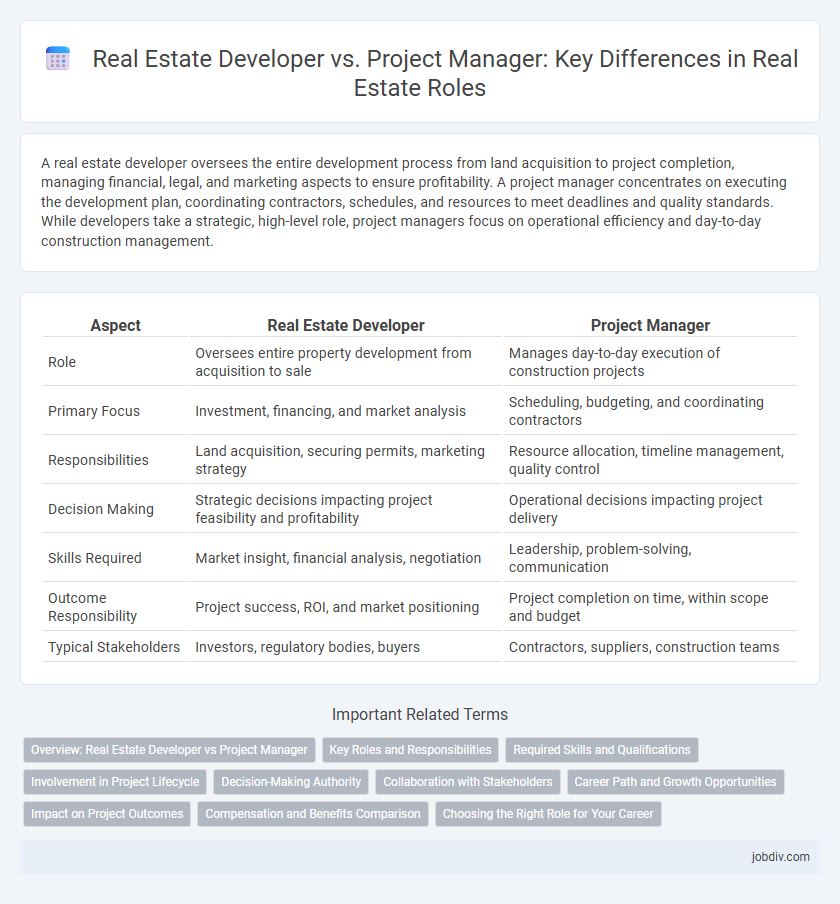A real estate developer oversees the entire development process from land acquisition to project completion, managing financial, legal, and marketing aspects to ensure profitability. A project manager concentrates on executing the development plan, coordinating contractors, schedules, and resources to meet deadlines and quality standards. While developers take a strategic, high-level role, project managers focus on operational efficiency and day-to-day construction management.
Table of Comparison
| Aspect | Real Estate Developer | Project Manager |
|---|---|---|
| Role | Oversees entire property development from acquisition to sale | Manages day-to-day execution of construction projects |
| Primary Focus | Investment, financing, and market analysis | Scheduling, budgeting, and coordinating contractors |
| Responsibilities | Land acquisition, securing permits, marketing strategy | Resource allocation, timeline management, quality control |
| Decision Making | Strategic decisions impacting project feasibility and profitability | Operational decisions impacting project delivery |
| Skills Required | Market insight, financial analysis, negotiation | Leadership, problem-solving, communication |
| Outcome Responsibility | Project success, ROI, and market positioning | Project completion on time, within scope and budget |
| Typical Stakeholders | Investors, regulatory bodies, buyers | Contractors, suppliers, construction teams |
Overview: Real Estate Developer vs Project Manager
Real estate developers oversee the entire property development process, including land acquisition, financing, design, and marketing, ensuring projects align with market demands and profitability goals. Project managers focus on the operational execution of development plans, coordinating contractors, schedules, budgets, and compliance to deliver projects on time and within scope. Both roles are critical but differ in scope, with developers emphasizing strategic vision and investment decisions, while project managers concentrate on detailed project implementation and resource management.
Key Roles and Responsibilities
Real estate developers oversee the entire lifecycle of property projects, including land acquisition, financing, design approvals, and market analysis to ensure profitable investments. Project managers handle day-to-day operations, coordinating contractors, managing timelines, budgets, and compliance with building codes to deliver the project on schedule and within scope. While developers focus on strategic vision and funding, project managers ensure operational execution and risk mitigation throughout construction.
Required Skills and Qualifications
Real estate developers require skills in market analysis, financial modeling, and strong negotiation abilities to secure land and funding, paired with qualifications such as a degree in real estate, business, or finance and extensive industry experience. Project managers in real estate need expertise in construction management, scheduling, risk management, and team leadership, often supported by certifications like PMP or a background in engineering, architecture, or construction management. Both roles demand effective communication and problem-solving skills but diverge in focus, with developers emphasizing strategic planning and project managers concentrating on execution and operational oversight.
Involvement in Project Lifecycle
A real estate developer drives the project from inception through financing, acquisition, design, and market analysis, overseeing the project's feasibility and strategic direction. The project manager focuses on the execution phase, coordinating construction schedules, budgets, contractors, and compliance to ensure timely delivery. Their combined efforts optimize project success by aligning high-level vision with operational precision throughout the entire real estate development lifecycle.
Decision-Making Authority
Real estate developers hold primary decision-making authority, overseeing project feasibility, financing, design, and marketing strategies to ensure overall success. Project managers execute these decisions by coordinating construction schedules, managing budgets, and liaising with contractors to maintain project timelines and quality. While developers set the vision and approval, project managers handle operational choices within their scope to deliver the project efficiently.
Collaboration with Stakeholders
Real estate developers drive project vision by securing financing, land acquisition, and regulatory approvals, shaping overall investment and development goals. Project managers facilitate collaboration among architects, contractors, and local authorities, ensuring timelines, budgets, and quality standards align with the developer's objectives. Effective communication between developers and project managers is crucial for mitigating risks, optimizing resource allocation, and delivering successful real estate projects.
Career Path and Growth Opportunities
Real estate developers focus on acquiring land, securing financing, and overseeing the overall vision of property projects, offering career growth towards executive roles in development firms or entrepreneurship. Project managers in real estate specialize in coordinating construction teams, ensuring timelines, budgets, and regulations are met, with career advancement leading to senior project management or operations leadership. Both paths offer robust growth, but developers often engage more with strategic business decisions, while project managers deepen technical and logistical expertise.
Impact on Project Outcomes
Real estate developers drive project vision, securing financing, permits, and key stakeholders, which shapes the overall feasibility and success of property developments. Project managers oversee daily operations, coordinating teams, schedules, and budgets to ensure timely completion and quality control of real estate projects. Effective collaboration between developers and project managers directly impacts project outcomes, influencing cost efficiency, timeline adherence, and market competitiveness.
Compensation and Benefits Comparison
Real estate developers typically receive higher compensation packages, including profit-sharing and bonuses tied to project success, while project managers earn stable salaries with performance incentives. Developers benefit from equity stakes and long-term gains, whereas project managers gain comprehensive benefits such as health insurance, retirement plans, and paid time off. The compensation gap reflects the risk and reward profiles, with developers bearing more financial risk but having greater earning potential over time.
Choosing the Right Role for Your Career
Real estate developers oversee the entire lifecycle of property projects, from land acquisition and financing to construction and marketing, demanding strong strategic and financial skills. Project managers focus on coordinating daily construction activities, managing timelines, budgets, and subcontractors to ensure successful project completion, requiring detail-oriented and leadership abilities. Choosing between these roles depends on whether you prefer high-level planning and investment decisions or hands-on management of construction processes.
Real Estate Developer vs Project Manager Infographic

 jobdiv.com
jobdiv.com